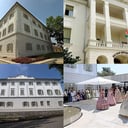Tales told at the piano, spun through melody and rhythm, take center stage on December 7, 2025, when Liszt Prize–winning pianist Balázs Fülei brings his story-driven recital to the Grand Hall of the Liszt Academy in Budapest. When musical patterns repeat, they stop being mere effects: they turn into images and characters, shift into scenes, and begin to narrate. In this special program, the stories knit into a sweeping chain.
When Ballades Start Talking
The evening starts at 7:30 p.m. with Brahms’ four Ballades, each one vivid and cinematic in its storytelling. Between them, short interludes by Schumann, Schubert, and Debussy break and bend the narrative, as if desire, visions, or a sudden brass band gate-crashing the imagination were scratching the record. These interruptions are the point: the flow of the tale keeps getting jostled—then picks up new meaning.
The Program, Front to Back
Part I:
– J. Brahms: Ballade in d minor, Op. 10/1
– R. Schumann: Romance in b minor, Op. 28/1
– J. Brahms: Ballade in D major, Op. 10/2
– F. Schubert: Impromptu in f minor, D 935/4
– J. Brahms: Ballade in b minor, Op. 10/3
– C. Debussy: The Interrupted Serenade
– J. Brahms: Ballade in B major, Op. 10/4
Intermission
Part II:
– F. Liszt: Legend No. 1 “St. Francis of Assisi Preaching to the Birds”
– B. Bartók: The Night’s Music
– M. Ravel: A Boat on the Ocean
– F. Liszt: Legend No. 2 “St. Francis of Paola Walking on the Waves”
In the second half, Liszt’s picture-book legends frame a soul’s voyage—a lonely sailor navigating inner seas—set in close dialogue with Bartók’s nature painting The Night’s Music, which hears nature drawing a human in. The stories multiply until the common thread emerges: life itself is doing the talking through sound.
Meet the Storyteller at the Keyboard
Balázs Fülei—winner of the Liszt, Artisjus, and Junior Prima awards—keeps more than thirty piano concertos in his repertoire, including the complete Beethoven, Brahms, and Bartók concertos. His solo recitals are meticulously curated and often come with personal spoken introductions that tilt classical music into a new light for listeners. Zoltán Kocsis once said: “Listening to Balázs Fülei was a tremendous experience for me. Based on his performance, I consider him one of the most promising Hungarian pianists of his generation.”
Fülei isn’t just acclaimed for performances “fully matured, flawlessly thought out, and worked out to the tiniest detail,” as the trade press puts it. He also invents formats. His “storytelling” concerts—an American tradition associated with Leonard Bernstein—bring audiences in with narrative, images, and poetry, making big works feel like they belong in everyday life. Some programs are tailored to adults; others are aimed at kids and teens. One thing never changes: the music is performed at the highest level, and the point of contact is always the listener in the room.
Bartók, Everywhere
His ties to Bartók run deep. During the 2016 Bartók Memorial Year, he was one of the most in-demand performers in Hungary and abroad. In Europe, audiences tend to know Bartók’s pieces; elsewhere, they’re sometimes hearing them for the first time. In Bengaluru (Bangalore), he gave a lecture on Bartók and folk music to an audience of two thousand. In Vietnam, he was the first to perform Bartók’s works: a solo recital at the Ho Chi Minh City Conservatory and a gallery concert in Hanoi, surrounded by paintings by Vietnamese artists inspired by Bartók’s music.
Stages, Studios, Students
Fülei made his Carnegie Hall solo debut in 2008 and has since appeared at the Vienna Konzerthaus, Moscow Tchaikovsky Conservatory, Tokyo’s Kioi Hall, and the Concertgebouw in Amsterdam. He has collaborated with leading symphony orchestras in Hungary and abroad, performed across Europe, Israel, the United States, Australia, Japan, China, and Vietnam, frequently tours with his Auer Trio, often partners with the Kodály Quartet—including in India—and has soloed with the world-class Camerata Bern at the Liszt Academy Grand Hall.
He works closely with contemporary composers, premieres new pieces, and records for radio. His own discography includes four solo albums: Bartók and Grieg (2013); moon-themed works by Brahms, Beethoven, Debussy, and Virágh András Gábor (Gábor Virágh) (2015); Liszt (2019); and a pairing of Beethoven’s and Schubert’s penultimate sonatas. The Auer Trio’s debut album arrived in 2019, and four more releases followed in 2022.
Teaching anchors his career. He has taught chamber music at the Liszt Academy since 2012, earned his doctorate in 2013, habilitation in 2018, and has led the Chamber Music Department since 2015. Beyond lessons, he creates platforms and concerts for promising students, moderates the programs himself, introduces performers, shares backstage context, and opens up each piece’s background. In 2016 he founded the Echo Summer Academy, an international course in instrumental and chamber music held annually at Károlyi Castle (Károlyi-kastély) in Fehérvárcsurgó, rooted in Hungarian chamber traditions and drawing participants from around the world.
Radio noticed. Since September 2020, he’s hosted the popular biweekly show Kvartett on Bartók Radio (Bartók Rádió). And in August 2020, he joined the Steinway Artists roster—alongside Martha Argerich, Vladimir Ashkenazy, Daniel Barenboim, Evgeny Kissin, Krystian Zimerman, Mitsuko Uchida, and Grigory Sokolov—recognizing artists who choose and champion Steinway instruments.
When and Where, and How Much
Date: Sunday, December 7, 2025, 7:30 p.m.
Venue: Liszt Academy Grand Hall, 1061 Budapest, District VI — Terézváros, Liszt Ferenc Square (Liszt Ferenc tér) 8.
Tickets: approximately $16 to $30</final





